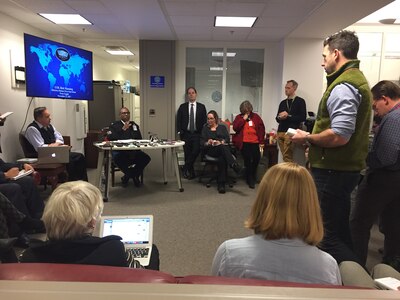By Jim Garamone DoD News, Defense Media Activity
WASHINGTON, Nov. 27, 2017 — The Nov. 24 attack on an
Egyptian mosque in northern Sinai that killed at least 305 men, women and
children is an example of why the United States must remain involved in the
Middle East, Pentagon spokesman Army Col. Rob Manning said today.
The United States must help partner nations build their own
defense and police capacity to “ensure [the Islamic State of Iraq and Syria],
al-Qaida and like-minded groups cannot plan and carry out attacks,” he said.
Manning gave an overview of the area during his weekly press
gaggle with Pentagon reporters. He said there are roughly 500 U.S. forces in
Syria and around 5,000 in Iraq. Defense Department officials are working on
providing a better run-down of U.S. forces in the countries as security
considerations permit, the colonel said.
Iraqi forces are working to improve security in areas they
have retaken from ISIS control, Manning said. This includes going into areas to
clear them of improvised explosive devices, clearing out weapons caches, disarm
booby traps and rooting out ISIS hold-outs.
“In Syria, in the last 24 hours, the [Syrian Democratic
Forces] has reinforced positions near the Iraq-Syria border, repelling an ISIS
reconnaissance element,” he said.
Coalition forces aided the SDF as it advanced along the
southern bank of the Euphrates River. “Also coalition forces provided counter-IED
training to Raqqa internal security force soldiers,” he said. The coalition
also passed over communications gear to Raqqa force personnel.
Over the weekend, President Donald J. Trump spoke with
Turkish President Recep Tayyip Erdogan and discussed the U.S. supply of arms to
the SDF. Turkish leaders are worried that arms supplied to the Kurdish portion
of the SDF could end up in the hands of the [Kurdistan Workers’ Party] -- a
designated Foreign Terrorist Organization.
“Consistent with that policy, we’re reviewing pending
adjustments to the military support provided to our Kurdish partners [in the
SDF], in as much as the military requirements of our defeat-ISIS and
stabilization efforts will allow us to prevent ISIS from returning,” Manning
said. “We remain very clear in that we are going to continue to target ISIS and
remain committed to protecting our NATO ally Turkey.”
Weapons provided to the SDF are limited and mission
specific, the colonel said.








No comments:
Post a Comment